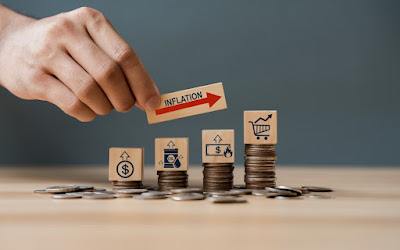Understanding the Impact of Inflation on the Economy
Inflation, the gradual increase in prices of goods and services over time, is a critical economic phenomenon with multifaceted impacts on the overall economy. While a moderate level of inflation is considered healthy for economic growth, excessively high or unpredictable inflation can lead to detrimental effects on consumers, businesses, and the economy as a whole.
#### 1. **Purchasing Power Erosion**
One of the most noticeable impacts of inflation is its effect on purchasing power. As prices rise, the value of money diminishes, leading to a reduction in what a unit of currency can buy. This decline in purchasing power affects consumers' ability to afford goods and services, especially those with fixed incomes, like retirees, who find their savings and pensions stretched thinner.
#### 2. **Uncertainty and Planning Challenges**
High inflation rates can lead to uncertainty in the economy. Businesses find it challenging to make long-term plans and investments due to unpredictable price increases. Uncertainty about future prices affects decision-making, potentially slowing down investments and economic growth.
#### 3. **Interest Rates and Savings**
Central banks often respond to inflation by increasing interest rates to curb spending and keep prices stable. While this can help control inflation, it also makes borrowing more expensive for businesses and individuals. Conversely, higher interest rates can benefit savers in the short term as they receive better returns on their savings. However, if interest rates fail to keep pace with inflation, savers may find their actual purchasing power reduced over time.
#### 4. **Income Redistribution**
Inflation doesn’t affect everyone uniformly. Creditors might experience losses as the real value of the money they are repaid decreases, while debtors can benefit by paying back loans with less valuable currency. Moreover, workers may demand higher wages to keep up with rising prices, leading to potential income redistribution between employers and employees.
#### 5. **Impact on Investments and Asset Prices**
Inflation influences the value of investments and assets. Tangible assets like real estate and commodities often see their values rise during inflationary periods, acting as a hedge against rising prices. Conversely, stocks and bonds might experience volatility and reduced returns as inflation erodes their value over time.
Conclusion
Inflation is a complex economic phenomenon with varied consequences, influencing nearly every aspect of the economy. While moderate inflation can signal a healthy, growing economy, high and erratic inflation can create instability, impacting consumers, businesses, investments, and overall economic growth. Policymakers constantly seek to strike a balance, aiming to maintain stable prices while promoting economic growth and stability. Understanding the multifaceted impacts of inflation is crucial in shaping effective economic policies that support sustainable and balanced growth.




.jpeg)
.jpeg)




.jpg)
